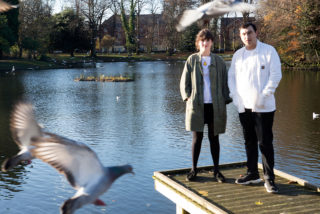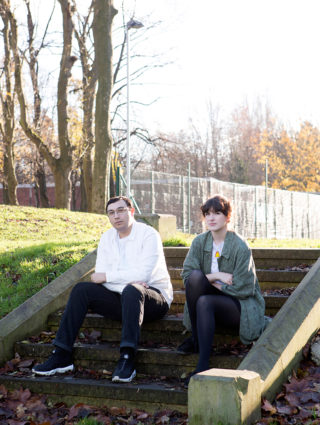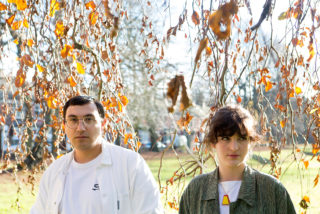Virginia Wing: ‘A performance can be anything you want it to be’
The forward motion of Sam Pillay and Alice Merida Richards

The forward motion of Sam Pillay and Alice Merida Richards
“Ultimately, you’re driving for what you’ve got in your head as your own perfect idea of what music should be.”
In a Manchester cafe, Sam Pillay of Virginia Wing is picking apart his band, their new record and the public reaction to it. “I’ve been thinking a lot about this, especially last night – I couldn’t sleep. The band’s gone through a lot of incarnations, and it seems like nowadays – and I’m not saying people are closed-minded, or anything – but if something doesn’t present itself with a clear idea of what it is from the get go, people have a hard time understanding it. I’ve read a few reviews of the record, and some of them have suggested that we’re making knowingly difficult music. That’s not what we intended at all.”
It often feels like that’s the accusation that critics fall back on when they’re having to write about something that eludes easy categorisation, and that’s certainly true of ‘Forward Constant Motion’, the second full-length from the once-London-, now-Manchester duo-based. Pillay talks of making the sort of music you’d want to hear yourself, which suggests serious eclecticism of tastes on his part and that of his bandmate, Alice Merida Richards.
This latest batch of songs doesn’t lend itself well to genre definition, with the sonic landscape constantly shifting. The psych influence is heavy, but it can’t be a psych record when there’s this much electronica running under the surface. Plus, Richards’ vocals are melodic enough to lend themselves to alt-pop hooks here and there – opener ‘Lily of Youth’ is a case in point. This is a complex patchwork quilt of an album, and one that demands that the listener pay close attention.

As Pillay points out, though, the group’s evolution has been an organic one. “We started the way a lot of bands do nowadays,” he says, “just with me fucking around in my bedroom. It was a lot more guitar-based; I was really into ‘soft psych’, as they called it at the time. It was the classic thing of the weird guy in his room, looping vocals hundreds of times. That was the aesthetic, and everything was very record-based, so when we started playing live, the only way to produce it was with guitars. I’d never sung and played guitar in a band before, and I felt like a fraud. That was when we started moving towards Alice singing.”
Richards interjects. “It’s important to point out that it’s not Sam’s personal project any more,” she says, “it’s very much a collaborative thing.”
“We’ve had some problems with people framing the band completely as my thing,” explains Pillay, “which is ridiculous because there’s so much of what we do that I have absolutely no input into. It’s one of those things that was never a consideration I had to have before I started making music with a woman, which is unfortunate. Men can automatically assume they’ll take the credit for something they’ve made. That doesn’t always happen for women.”
Virginia Wing certainly come across as a unit. Having lived together in London for a while, the pair made the move to Manchester this past summer, where they’ve settled just south of the city in a house owned by Bernie Phillips, a mythical local figure who’s spent nearly fifteen years putting up bands to give back to musicians. “Stephin Merritt’s dad, Scott Fagan, just made a record in the attic,” they tell me, along with how there were myriad reasons for the move north, but financial considerations and London’s pressure-cooker environment were chief among them
“I think, away from London, your base level anxiety diminishes,” says Richards. “It’s a harder existence there; everything seems amplified, and everything’s competitive – even just getting on a train or trying to get into a place to get breakfast at the weekend. You end up doing everything you can to disconnect from that, and that puts you in your own little bubble a lot of the time. You end up more insular.”
“And the other thing is,” presses Pillay, “in places like Manchester and Glasgow, people who are into different things group together – there’s like a wider, more general subculture. In London, because it’s so vast, every tiny niche becomes its own group. You can be into a specific type of electronic music and it’ll feel like a big, vast scene of its own, because when there’s so many people around, you can afford to be that exclusive. I just think that’s a really narrow world to live in, when you just hang around with people who are into the exact same stuff.”

With the move only taking place four months ago, ‘Forward Constant Motion’ was written and recorded in London. The beginning of the latter process came at around the same time the pair let go of the flat in the capital. Misha Hering, the album’s producer, came to the rescue. “It was a weird time,” recalls Richards, “because we were immediately out of a home, and he very kindly put us up for six weeks, while we were recording at his studio, Holy Mountain.”
“You’ve also got this timetable in your head when you make a record,” adds Pillay add, “and you think it’s going to be finished by a certain point, and it never is. So we had to do more recording, after taking a month off, and there was so much going on – we were moving about quite a lot, house sitting for friends and that kind of thing. We felt quite displaced for a while.”
With the band feeling adrift, the grounding influence provided by Hering was key, and not just in the immediate, practical sense of providing them with a place to live and work. He’s already an established presence in this particular corner of the music world, having worked on records by the likes of Echo Lake and A Grave with No Name, and as Pillay has it, he went above and beyond the call of duty for Virginia Wing. “He really bent over backwards. Music can be such an inherently egotistical thing, so it takes a very special kind of person to be able to be selfless enough to help somebody make the record they want to make. I really don’t think many bands at our level have that, honestly.”
On the face of it, there was another element to the group’s upheaval, too; previously, they’d officially been viewed as a three-piece, with drummer Sebastian Truskolaski rounding out the lineup. “To be completely honest with you, we’d actually been a two-piece for years,” explains Pillay. “Our drummer, he’s a really close friend – he lived with us and we love him to bits – but his thing’s always been academia, really. He’s a post-war German philosophy guy – that’s what he gets excited about.”
Richards had already mentioned that whatever Virginia Wing were aiming for – it wasn’t to be a genre piece or a nostalgia band – and Truskolaski’s lack of creative input made sense in that respect. “I think the only thing I’ve heard him get excited about musically, in years, was Factory Floor,” laughs Pillay. “Otherwise, it’s just old music. I think he just needed an excuse to hang out with us; he’s a really focused guy, and he spent a lot time really entrenched in his PhD.”

The point that Pillay and Richards seem to keep circling back to is that, in a lot of ways, it’s a miracle that they ever managed to make a first record, let alone a second. Both had chequered histories when it came to committing, with projects left half-finished and releases restricted to the short-form. “I’d been in bands since I was thirteen, so by the time we made our first album, it’d taken me ten years to get there,” Pillay reflects. “It was a case of proving to ourselves we could actually do it.”
“You feel like you’ve got something to prove and that it has to be really strong, a statement of intent,” concurs Richards. “Especially because I had a bit of a track record of not finishing things. I was in another band where we recorded half an album, and then left it at that.”
What LP2 represented to Virginia wing, then, was the opportunity to broaden their horizons in terms of where they were taking their stylistic cues from, and which influences they were allowing to permeate the songwriting process. It’s for that reason that there’s so much variety on the album, especially by way of comparison to its predecessor, which they readily admit was much more limited in scope. “We were quite inexperienced back then, especially as Virginia Wing,” remembers Pillay, “and I don’t think we would’ve been able to pull off what we did here convincingly. I was just thinking the other day; we had this one song for the first album that sounded like we were trying to be Silver Apples, and I’m so fucking glad that we didn’t put that on the record, because we just would’ve sounded like we were ripping them off – we didn’t have the confidence to rip that kind of thing off. I think now, we’re a little more relaxed and confident, knowing we can make a record and the arse won’t fall out of it.”
“You can take some risks and not worry about, is this tasteful? Is it right? Is it you?” continues Richards. “I watched this interview the other day with Laurie Anderson, and she was saying that people are always telling you what ‘you’ is, and that you don’t always have to be ‘you’. The point she was making was that you can be as big as you want to be; not in the fame sense, but in terms of the net you cast and the ideas you have. You can get carried away, but better to be carried away than feel limited.”
As focus turns to 2017, work on their third album is apparently already underway along with a collaboration planned early in the year with XAM Duo, the side-project of MB from Hookworms. “It’s very spacey, very droney. They’re two very non-spiritual white lads trying to make spiritual jazz,” according to Pillay. Touring plans are beginning to fall into place, too. From the band’s perspective, the challenge in bringing Virginia Wing – and ‘Forward Constant Motion’ in particular – to the stage will lie less in trying to faithfully recreate the songs and more in making sure that whatever happens, there’s an authenticity to it.
“I’ve been enjoying performing live a lot more since it’s just been the two of us,” says Pillay wryly, “which is kind of ironic because there’s some songs I do fuck all on. I might just be pressing a button or something, but I don’t see the point in trying to play something for the sake of it, just to look as if you’re doing something up there. Some of these songs, you’re not going to be able to replicate them live as they are on the record.”
“I don’t think you should be held back by rockist constraints,” offers Richards. “You shouldn’t worry about people wanting to see the bass player playing the bassline. It’d essentially be that thing of when you were watching pop bands as a kid, and they’d be playing to a backing track, but one of them would have a guitar, which was supposed to give the whole thing an air of legitimacy, but was really just bullshit. A performance can be anything you want it to be, we think.”